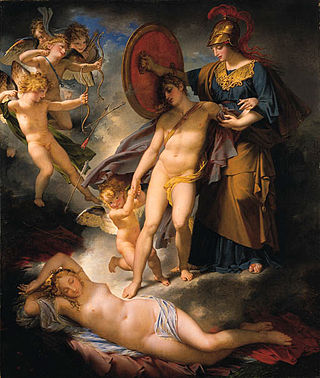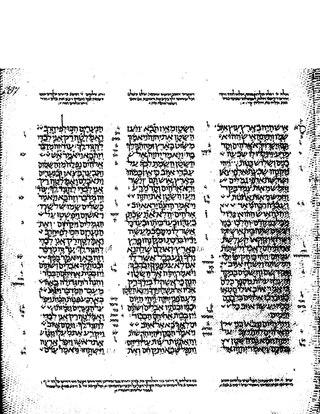
The Book of Job, or simply Job, is a book found in the Ketuvim ("Writings") section of the Hebrew Bible (Tanakh), and is the first of the Poetic Books in the Old Testament of the Christian Bible. Scholars are generally agreed that it was written between the 7th and 4th centuries BCE. It addresses theodicy, why God permits evil in the world, through the experiences of the eponymous protagonist. Job is a wealthy and God-fearing man with a comfortable life and a large family; God, having asked Satan for his opinion of Job's piety, decides to take away Job's wealth, family and material comforts, following Satan's accusation that if Job were rendered penniless and without his family, he would turn away from God.

The Book of Proverbs is a book in the third section of the Hebrew Bible and a book of the Christian Old Testament. When translated into Greek and Latin, the title took on different forms: in the Greek Septuagint (LXX) it became Παροιμίαι ; in the Latin Vulgate the title was Proverbia, from which the English name is derived.

The deuterocanonical books are books and passages considered by the Catholic Church, the Eastern Orthodox Church, the Oriental Orthodox Churches, and the Assyrian Church of the East to be canonical books of the Old Testament, but which Protestant denominations regard as apocrypha. They date from 300 BC to 100 AD, mostly from 200 BC to 70 AD, before the definite separation of the Christian church from Judaism. While the New Testament never directly quotes from or names these books, the apostles most frequently used and quoted the Septuagint, which includes them. Some say there is a correspondence of thought, and others see texts from these books being paraphrased, referred, or alluded to many times in the New Testament, depending in large measure on what is counted as a reference.

Wisdom, sapience, or sagacity is the ability to contemplate and act productively using knowledge, experience, understanding, common sense, and insight. Wisdom is associated with attributes such as unbiased judgment, compassion, experiential self-knowledge, self-transcendence and non-attachment, and virtues such as ethics and benevolence.

Willow River is a city in Pine County, Minnesota, United States, at the confluence of the Kettle and Willow Rivers. The population was 415 at the 2010 census.

Wisdom is a small town in Beaverhead County, Montana, United States. The population was 98 at the 2010 census. The ZIP Code of the area is 59761. The town includes three tourist lodgings, service station, grocery, school (K-8), post office and a Forest Service office.

The Gospel of the Hebrews, or Gospel according to the Hebrews, is a lost Jewish–Christian gospel. The text of the gospel is lost, with only fragments of it surviving as brief quotations by the early Church Fathers and in apocryphal writings. The fragments contain traditions of Jesus' pre-existence, incarnation, baptism, and probably of his temptation, along with some of his sayings. Distinctive features include a Christology characterized by the belief that the Holy Spirit is Jesus' Divine Mother and a first resurrection appearance to James, the brother of Jesus, showing a high regard for James as the leader of the Jewish Christian church in Jerusalem. It was probably composed in Greek in the first decades of the 2nd century, and is believed to have been used by Greek-speaking Jewish Christians in Egypt during that century.
In Christianity, the word of wisdom is a spiritual gift listed in 1 Corinthians 12:8. The function that this gift is given varies. Some Christians see in this gift a prophetic-like function. Others see in the word of wisdom a teaching function. This gift is closely related with the gift of the word of knowledge.

Sophia is a central idea in Hellenistic philosophy and religion, Platonism, Gnosticism and Christian theology. Originally carrying a meaning of "cleverness, skill", the later meaning of the term, close to the meaning of Phronesis, was significantly shaped by the term philosophy as used by Plato.

Chokmah is the Biblical Hebrew word rendered as "wisdom" in English Bible versions.

The biblical apocrypha denotes the collection of apocryphal ancient books thought to have been written some time between 200 BC and AD 400. The Roman Catholic, Eastern Orthodox and Oriental Orthodox churches include some or all of the same texts within the body of their version of the Old Testament, terming them deuterocanonical books. Traditional 80-book Protestant Bibles include fourteen books in an intertestamental section between the Old Testament and New Testament called the Apocrypha, deeming these useful for instruction, but non-canonical. To this date, the Apocrypha are "included in the lectionaries of Anglican and Lutheran Churches". Anabaptists use the Luther Bible, which contains the Apocrypha as intertestamental books; Amish wedding ceremonies include "the retelling of the marriage of Tobias and Sarah in the Apocrypha". Moreover, the Revised Common Lectionary, in use by most mainline Protestants including Methodists and Moravians, lists readings from the Apocrypha in the liturgical calendar, although alternate Old Testament scripture lessons are provided.
The Five Strengths in Buddhism are faith, energy, mindfulness, concentration, and wisdom. They are one of the seven sets of Bodhipakkhiyadhamma. They are paralleled in the five spiritual faculties, which are also part of the Bodhipakkhiyadhamma.
The Mēnōg-ī Khrad or Spirit of Wisdom is one of the most important secondary texts in Zoroastrianism written in Middle Persian.

The Book of Sirach or Ecclesiasticus is a Jewish work, originally in Hebrew, of ethical teachings, from approximately 200 to 175 BCE, written by the Judahite scribe Ben Sira of Jerusalem, on the inspiration of his father Joshua son of Sirach, sometimes called Jesus son of Sirach or Yeshua ben Eliezer ben Sira.
Prophets in Islam are individuals in Islam who are believed to spread God's message on Earth and to serve as models of ideal human behaviour. Some prophets are categorized as messengers, those who transmit divine revelation, most of them through the interaction of an angel. Muslims believe that many prophets existed, including many not mentioned in the Quran. The Quran states: "And for every community there is a messenger." Belief in the Islamic prophets is one of the six articles of the Islamic faith.

Andre Alexander Shaquille Wisdom is an English professional footballer who plays as a right-back or centre-back.

Impacted wisdom teeth is a condition where the third molars are prevented from erupting into the mouth. This can be caused by a physical barrier, such as other teeth, or when the tooth is angled away from a vertical position. Completely unerupted wisdom teeth usually result in no symptoms, although they can sometimes develop cysts or neoplasms. Partially erupted wisdom teeth can develop cavities or pericoronitis. Removal of impacted wisdom teeth is advised in the case of certain pathologies, such as nonrestorable caries or cysts.

Proverbs 1 is the first chapter of the Book of Proverbs in the Hebrew Bible or the Old Testament of the Christian Bible. The book is a compilation of several wisdom literature collections, with the heading in 1:1 may be intended to regard Solomon as the traditional author of the whole book, but the dates of the individual collections are difficult to determine, and the book probably obtained its final shape in the post-exilic period. This chapter is a part of the first collection of the book.

Job 28 is the 28th chapter of the Book of Job in the Hebrew Bible or the Old Testament of the Christian Bible. The book is anonymous; most scholars believe it was written around 6th century BCE. This chapter records the speech of Job, which belongs to the Dialogue section of the book, comprising Job 3:1–31:40.

Job 32 is the 32nd chapter of the Book of Job in the Hebrew Bible or the Old Testament of the Christian Bible. The book is anonymous; most scholars believe it was written around 6th century BCE. This chapter records the speech of Elihu, which belongs to the "Verdicts" section of the book, comprising Job 32:1–42:6.











